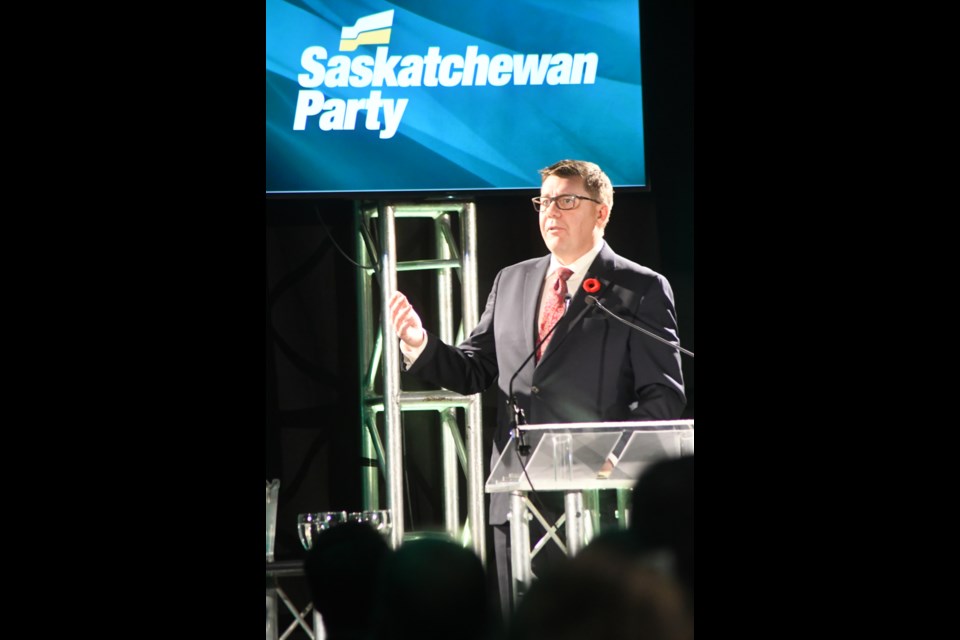Premier Scott Moe believes the Saskatchewan First Act could defend the province’s jurisdictional authority over natural resources and protect it from Ottawa’s damaging climate change policies.
It is crucial to have the right kind of government to promote economic growth, and across Saskatchewan, many mayors, reeves and councils want to expand economic opportunities for everyone, Moe said during the Nov. 3 Premier’s Dinner at the Heritage Inn.
Furthermore, the provincial government is all about growth, expanding economic opportunities and reducing barriers for businesses, he continued. However, the NDP-Liberal coalition in Ottawa does not have the same attitude, especially with natural resources.
Moe pointed out that Europe is facing electricity brownouts and blackouts this winter. He singled out Germany, which asked Canada for liquid natural gas, but was told it would receive hydrogen in five years from a non-existent plant.
This forced Germany to sign an LNG agreement with the United Arab Emirates. Meanwhile, the central European country is rushing to build LNG plants, re-start shuttered coal plants and re-ignite nuclear plants
What’s happening in Germany will likely occur in other countries and make for a difficult winter, the premier said. While the war in Ukraine is one reason for this problem, the other is because European governments sought to phase out reliable heating and power generation methods.
When countries discourage oil and gas production, shut down coal-fired power plants, phase our nuclear power, fail to diversify their energy supply and put their faith in green technology that faces major limitations with baseload power, “you better have a good backup plan,” Moe stated.
Germany’s backup plan was to buy one-third of its coal, one-third of its oil and two-thirds of natural gas from Russia, he said. Meanwhile, the European Union is dealing with the consequences of those decisions to eliminate fossil fuels without adequate replacements.
“In life, you cannot ignore the consequences of reality … . We should learn from this in Canada. I’m a little bit concerned that we’re not,” Moe continued. “We’re heading down that same dark cul-de-sac that Germany started to head down eight to 10 years ago.”
The premier was concerned that Canada’s climate and energy policies were not based on reality. He pointed to the province’s recent White Paper highlighting how Ottawa’s damaging climate policies would cost Saskatchewan $111 billion by 2035 — or $92,500 per person.
It’s one thing to discuss capping emissions in the oil and gas industry, but it’s another thing entirely to cap production, Moe said. The nation is discussing clean fuel and electricity standards while wanting to shut down natural gas pipelines — which would affect Moose Jaw’s Great Plains Power Station.
There is also discussion of reducing fertilizer use, which would negatively affect Saskatchewan since it’s the breadbasket of the world that provides food security to North America and worldwide, he continued.
“And soils in our province — due to zero-till and GPS and all of the other innovations and technologies used in agriculture — … are already some of the largest carbon sinks in the world,” the premier exclaimed to applause.
Saskatchewanians may feel disenfranchised and disillusioned, but they are not discouraged, Moe continued. Moreover, the government will do everything to defend the province’s interests and protect its potential.
Moe expected the Saskatchewan First Act to define the province’s exclusive jurisdiction over its natural resources and provide much-needed certainty about its place in Confederation.
While Saskatchewan will invest in renewables, the government will continue to advocate for continental energy security, he continued.
For example, worldwide demand for oil in 1995 was 69 million barrels per day (bopd), while today, it’s 110 million bopd, the premier stated. Furthermore, fossil fuels accounted for 82 per cent of energy consumption decades ago, while today it is 81 per cent — even though $3.2 trillion has been invested worldwide in renewables.
“It’s time to put away the fantasy that we can just transition to 100-per-cent renewables or 100-per-cent carbon-free sources at the flip of a switch,” Moe said.
Saskatchewan has many clean and sustainable technologies, such as carbon capture and storage, crop and ag techniques, and responsible manufacturing, mining, forestry, agriculture and processing. It’s also pursuing small modular nuclear reactors and food security innovations.
“In Saskatchewan and in Canada, we have so very much to be proud of … ,” Moe added. “This is our time to unlock Saskatchewan’s enormous potential that lies before us.”




